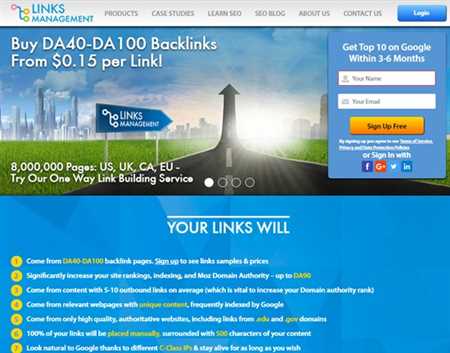

In today’s digital landscape, elevating online presence has become crucial for businesses eager to capture the attention of potential customers. Various factors contribute to achieving higher visibility in search engine results, and among these, external links play a significant part. Their importance extends beyond mere semantics, as they can substantially affect an entity’s position within competitive markets.
As organizations seek effective strategies to enhance visibility, some opt for unconventional measures to gain an advantage over rivals. This practice raises questions about integrity and sustainability within the digital marketing realm. On one hand, it highlights a growing trend where firms pursue shortcuts, while on the other, it emphasizes the significance of building genuine connections within the digital space.
Understanding the dynamics at play can reveal not only the impact of external endorsements but also the ethical considerations that accompany such strategies. Analyzing whether this trend reflects a legitimate pathway to success or simply a series of fleeting tactics can provide valuable insights for both marketers and consumers.
Effective connections between online platforms play a significant part in determining visibility and success within search engines. When various sources reference a particular domain, it signals credibility and relevance. Such endorsements can greatly enhance visibility, propelling content to favorable positions in search results.
A diverse strategy for acquiring links can contribute immensely to overall search engine optimization. Quality over quantity is essential; links from reputable and relevant domains hold more power than a multitude of low-value ones. Additionally, contextual placement within content can elevate the perceived authority, leading algorithms to favor such interconnectedness.
Monitoring and analyzing these references can provide insights into competitive positioning. Sites with strong link profiles often outperform those with weaker connections, indicating that the importance of these relationships should not be underestimated. Link-building strategies that prioritize natural growth alongside targeted outreach are likely to yield the best results in enhancing online presence.
In online visibility, links from one domain to another serve as vital connections that significantly influence a site’s prominence in search results. These links not only provide pathways for users to navigate between various platforms, but they also signal to search engines the relevance and credibility of content. Their impact is profound, shaping how websites are perceived in the vast digital landscape.
Essentially, quality links act as endorsements, indicating that a particular resource is valuable enough to be referenced by others. This establishes trustworthiness and authority within a specific niche or industry. As such, websites with a higher quantity of reputable links tend to perform better in terms of visibility and audience engagement.
Moreover, establishing a robust linking strategy fosters relationships within an online community, encouraging collaboration and content sharing. Each link serves a dual purpose, enhancing both user experience and optimizing search engine results. In a competitive environment, understanding the significance of these connections is crucial for any digital marketing initiative aiming for success.
In the realm of digital marketing, certain elements serve as essential connectors among various online entities. These connections facilitate navigation and enhance authority, contributing to overall online presence and visibility. Understanding these crucial components is vital for anyone striving for success in search engine optimization.
Key aspects of these crucial links include:
Connection Building: They link one online page to another, creating a network that allows users to discover related content.
Authority Transfer: When a reputable source links to a particular page, it imparts credibility, suggesting trustworthiness to search engines.
Traffic Generation: Quality links can significantly drive referral traffic, leading visitors from one platform to another.
Search Engine Ranking Improvement: Search engines utilize these links as a metric to assess the relevance and quality of content, influencing search results.
Ultimately, understanding the essence and functionality of these vital connections is instrumental for organizations looking to enhance their digital footprint and connect with their target audience effectively.
Search engines consider various elements when determining the relevance and credibility of online content. One significant factor is the presence of links from other sources that direct users to a specific page. These connections serve as endorsements, indicating that the content is trustworthy and valuable. The more high-quality sites reference a page, the greater its authority in the eyes of search algorithms.
Here are several reasons why these links are highly regarded:
Trustworthiness: Links from reputable domains signal to search engines that the linked content is reliable and of high quality.
Relevance: When a link comes from a site within a similar niche or industry, it adds contextual value, improving the chances of higher visibility.
Citation Metric: Just as academic papers cite other works to build on research, links act as citations that bolster a site’s credibility and authority.
Furthermore, the diversity of linking domains enhances a site’s profile:
Variety: A wide range of referring domains can indicate a broad acceptance and recognition of the content.
Social Signals: Links often correlate with user engagement and sharing, which are additional indicators of content relevance.
Long-term Impact: Quality links can continue to provide search engine benefits over time, contributing to sustained traffic and visibility.
In summary, links play a pivotal role in how search engines gauge the integrity and importance of online content. Their value extends beyond mere numbers; they reflect a site’s standing within its particular domain, shaping how web users discover and interact with information.
Gaining valuable links from reputable sources can significantly enhance online visibility and credibility. Focusing on effective methods not only builds authority but also fosters meaningful connections within relevant industries. Below are several approaches that can be utilized to obtain high-quality links.
Create High-Quality Content: Developing informative and engaging content serves as a foundation for attracting attention. Unique articles, infographics, or videos that provide genuine value encourage others to link back to them naturally.
Guest Posting: Writing articles for other blogs or websites in the same niche allows for exposure to a new audience. By including a link to one’s own site within the author bio or content, you can gain links while offering value to the host site.
Networking: Building relationships with influencers and industry leaders can lead to opportunities for collaboration. Participating in online forums, social media groups, or industry events can open doors for link-sharing agreements.
Broken Link Building: Identifying broken links on trusted sites and suggesting your content as a replacement can be a win-win situation. This method not only helps the website owner fix outdated links but also allows you to gain a new link.
Resource Page Link Building: Many websites maintain resource pages that curate valuable information on specific topics. Reaching out to these sites and suggesting your content as a worthy addition can lead to valuable backlinks.
Participating in Online Communities: Engaging in platforms like Quora or Reddit provides an outlet to share expertise. By answering questions or providing insights related to your field, there is potential to earn links back to your site.
Implementing these strategies effectively can contribute to a stronger online presence. Commitment to quality and consistency in outreach efforts can yield significant long-term benefits.
In the digital landscape, strategies for enhancing visibility can largely be categorized into two main approaches. Each method presents its own set of advantages and challenges, impacting how online presence is cultivated and sustained over time.
Organic Techniques:
Reliance on quality content creation, focusing on valuable information that meets user needs.
Utilization of effective SEO practices, including keyword optimization and site structure improvements.
Encouragement of genuine user engagement and natural link acquisition through shares and referrals.
Investment in building long-term relationships within relevant communities to enhance credibility.
Paid Strategies:
Direct investment in advertising to gain immediate visibility across various platforms.
Purchase of links or placements aimed at quick traffic spikes, albeit at potential risk to sustainability.
Access to analytics-driven insights to fine-tune campaigns and maximize return on investment.
Flexibility in budget allocation to pursue different opportunities for exposure.
Understanding the distinct characteristics of each method is essential for making informed choices. While organic techniques can foster enduring relationships with audiences, paid strategies can offer rapid results. Ultimately, a balanced approach may yield the most beneficial outcomes in enhancing online visibility.
Achieving sustainable advancement in online visibility is a multifaceted endeavor that brings significant rewards over time. Embracing authentic strategies fosters not only increased traffic but also enhances credibility and fosters a loyal audience. Instead of seeking quick fixes, focusing on gradual improvements can yield enduring outcomes that withstand the test of time.
Investing in organic development establishes a foundation of trust with users and search engines alike. By producing quality content and engaging authentically with audiences, businesses cultivate relationships that often translate into repeat visits and referrals. This, in turn, leads to improved conversion rates and customer loyalty.
Prioritizing organic methods reinforces a brand’s presence in a competitive digital landscape. Over time, the cumulative impact of these efforts creates a robust online footprint that attracts new customers while retaining existing ones. The decision to commit to an authentic approach not only sets the stage for short-term gains but ultimately paves the way for lasting success.